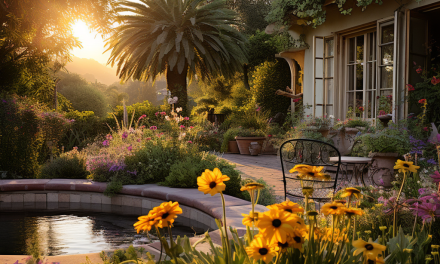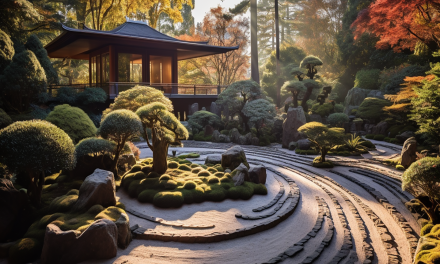As an Amazon Associate I earn from qualifying purchases.
The gentle rustle of leaves, the meticulous patterns on raked gravel, and the profound stillness that envelops you—this is the magic of a Zen garden. Hello, dear readers, it’s Gayle the Gardener here. Over the years, I’ve been deeply captivated by the philosophy and artistry behind Zen gardens. These spaces, though minimalistic, carry within them a universe of thought, peace, and connection to nature.
Originally emerging from the tranquil temples of Japan, Zen gardens have become a cherished part of many homes worldwide. And it’s no surprise why. In our often chaotic and fast-paced world, having a serene corner right in our backyards offers a respite, a place to pause, reflect, and rejuvenate.
For those of you looking to embark on this journey of crafting tranquility, I’ll be your guide. Together, we’ll delve into the history, principles, and Zen Garden Design Ideas that can transform your outdoor space into a haven of peace. Whether you have an expansive lawn or just a tiny balcony, the essence of Zen can find its way into any nook.
Core Principles of Zen Gardens
Zen, at its heart, isn’t just about arranging rocks and raking sand, but it’s a reflection of our inner world, a manifestation of harmony, balance, and mindfulness. As we venture deeper into the world of Zen gardens, understanding its core principles will be our compass.
Mindfulness and Connection to Nature:
Every element in a Zen garden is purposefully chosen and placed. The act of raking the gravel or choosing a stone isn’t just a design decision; it’s a meditative practice. It’s about being present in the moment, feeling the texture of the gravel, understanding the weight and shape of each stone, and listening to the whisper of the leaves. By creating a Zen garden, we’re not just designing a space; we’re deepening our connection to nature and, in turn, to ourselves.
The Concept of Minimalism and its Role in Zen Aesthetics:
In today’s world, ‘more’ often feels like the answer. Yet, in Zen, less is more. Minimalism isn’t about deprivation but about carefully choosing what truly matters. In our gardens, this means fewer elements, but each one rich with intention and purpose. The absence of clutter allows the mind to rest, and in this simplicity, we often find profound beauty.
Emphasis on Balance and Harmony:
Nature is inherently balanced. The sun and the moon, day and night, ebb and flow – there’s a rhythm to everything. In our Zen gardens, we strive to capture this balance. It’s not just about placing a rock here or a plant there; it’s about creating a harmonious dialogue between each element. Whether it’s the contrast between the ruggedness of a stone and the softness of moss or the interplay of shadows and light, achieving balance is pivotal.
Pro-tip: When planning your Zen garden, always take a moment to sit and observe. Feel the natural flow of the space, the way the sun casts its rays, and the direction of the wind. These subtle cues can guide your design choices, ensuring your garden is a harmonious extension of nature itself.
As we delve further, I’ll be sharing specific Zen Garden Design Ideas and elements that can bring these principles to life in your backyard. But remember, while tips and guidance are valuable, your personal touch, your connection to the space, is what will make your Zen garden genuinely unique.
Key Elements in Zen Garden Design
Diving into the world of Zen gardens has been one of the most fulfilling adventures of my gardening journey. It’s more than just landscaping—it’s an art and a spiritual practice combined. Let’s delve deeper into the essential elements that truly bring a Zen garden to life.
Raked Gravel and Sand:
The raked patterns on gravel and sand are perhaps the most iconic and meditative aspects of a Zen garden. It’s mesmerizing to watch and even more therapeutic to create. Every line, every curve represents the ripples of water or the waves of the sea, bringing a sense of motion to an otherwise still setting.
Pro-tip: Opt for gravel or sand that contrasts beautifully with the other elements of your garden. A lighter shade can mimic the gleam of water under moonlight, while a darker tone can add depth and mystery to your garden’s landscape.
Rocks and Stones:
To me, each rock or stone placed in a Zen garden tells a story. Some might represent islands, others mountains, or even creatures of the deep. Their arrangement is crucial, and it’s an art form in itself. Every stone should feel like it’s been there for eons, harmoniously coexisting with its surroundings.
Pro-tip: When selecting stones, choose ones that evoke emotion in you. Some might resonate with calm, others with strength, or even mystery. Their shapes, sizes, and textures should feel right to you, adding a personal touch to your Zen space.
Plants and Moss:
While Zen gardens often lean towards minimalism, the soft touch of greenery can’t be overlooked. Moss, especially, brings a lush carpet-like texture, symbolizing growth and tranquility. Plants, on the other hand, add height, color, and life to the serene landscape.
Pro-tip: Opt for plants that require minimal care but bring maximum aesthetic appeal. Think of elegant grasses, sturdy bonsais, or even aromatic herbs that engage more than just the sense of sight.
Water Features:
Water, with its fluidity and reflective properties, introduces dynamism to a Zen garden. Whether it’s a subtle stone basin collecting rainwater or a gentle stream babbling through the garden, its presence is both calming and invigorating.
Pro-tip: Consider the sound that water makes in your chosen feature. The gentle trickle of a stream or the soft drips into a stone basin can significantly enhance the meditative quality of your garden.
Remember, while these elements are central to the concept of Zen gardens, it’s the intention and emotion you pour into your space that truly defines it. Your garden should be a reflection of your inner self, a sanctuary where both your body and soul feel at peace.
Crafting Your Own Zen-Inspired Oasis
Embarking on the journey to create a Zen-inspired space in your backyard is an intimate experience. It’s a dance between the heart’s desires and the land’s natural tendencies. As I’ve crafted my own spaces over the years, I’ve discovered that it’s less about replicating a traditional design and more about letting your spirit shine through. Let me share some insights to guide you in creating your very own Zen sanctuary.
Planning and Visualizing Your Space:
Every good garden starts with a vision. Close your eyes and imagine the kind of serenity you want to evoke. Do you hear the sound of water? Can you feel the texture of the raked gravel underfoot? Allow your senses to guide your design.
Pro-tip: Sketching out your ideas on paper or using digital landscaping tools can give clarity to your vision, making the actual creation process smoother.
Starting Small: Zen Corners and Mini Gardens:
You don’t need vast expanses of land to infuse Zen into your backyard. Often, the most profound experiences come from the tiniest corners. A small alcove with a stone, a few plants, and a simple water feature can be just as impactful as a sprawling garden.
Pro-tip: If you’re new to Zen gardening, beginning with a small space can help you grasp the fundamentals without feeling overwhelmed. It’s a great way to experiment and learn.
Committing to Regular Maintenance and Mindfulness Practices:
A Zen garden is alive, and like all living things, it requires care. Regular maintenance not only keeps your garden looking pristine but also becomes a meditative practice in itself. Raking the gravel, pruning the plants, or just sitting and observing can be deeply therapeutic.
Pro-tip: Dedicate a few moments each day or a specific time each week for your garden. This consistent attention not only upkeeps the space but also deepens your connection with it.
5. Benefits of a Zen Garden
Having a Zen garden is more than just an aesthetic delight; it’s a holistic experience that touches multiple facets of life.
Mental and Emotional Wellness:
In today’s fast-paced world, finding a moment of peace can be a challenge. Your Zen garden becomes that oasis of calm, a place where the mind can wander freely, unhindered by the chaos of the outside world.
Boost in Property Value and Aesthetic Appeal:
A well-maintained Zen garden can elevate the overall appeal of your property. It’s not just a garden; it’s an art piece, a conversation starter, and a testament to your commitment to beauty and tranquility.
A Space for Meditation and Relaxation:
For those who practice meditation or just seek moments of quiet reflection, a Zen garden offers the perfect setting. The harmony of elements, the soft sounds, and the gentle play of light and shadow create an ambiance that invites introspection.
While these benefits are tangible, the true magic of a Zen garden lies in the intangible feelings it evokes—the profound peace, the subtle joy, and the deep connection to the world around and within.
Gayle’s Personal Reflections on Zen Gardening
Through the seasons and the years, as I’ve nurtured my Zen gardens, they, in turn, have nurtured me. There’s a depth of understanding and connection that develops, a bond that’s hard to put into words, but I’ll try to share a glimpse of my journey with you.
The Dance of Patience and Reward:
Zen gardening has taught me patience like no other. Whether it’s waiting for moss to grow, for water to clear after a rain, or for gravel patterns to form perfectly, there’s an inherent waiting period in every step. But with patience comes reward—seeing your vision come to life, bit by bit, is immensely gratifying.
Pro-tip: Embrace the waiting periods. They offer a beautiful opportunity to observe, reflect, and grow alongside your garden.
Finding Myself in the Garden:
Every rake line, every stone, and every plant in my Zen garden carries a piece of me. It’s where I’ve laughed, cried, pondered, and celebrated. The garden, in its silent wisdom, has been a mirror, reflecting back my emotions, dreams, and aspirations.
The Eternal Learner:
One thing’s for certain: with Zen gardening, the learning never stops. Nature is the most unpredictable and the most wonderful teacher. Whether it’s a new plant species I discover or a different pattern the wind creates on the gravel, there’s always something new to marvel at.
Pro-tip: Keep a garden journal. Documenting your observations, feelings, and the changes in your garden can be a beautiful way to track your journey and the lessons learned.
Embarking on Your Own Zen Journey
Every Zen garden is a story, a personal narrative of its creator. As you set forth on this path, remember to pour your heart into every choice, every action. It’s not just about aesthetics; it’s about creating a space that resonates with your soul.
For tools, materials, or further reading on Zen Garden Design Ideas, I’ve curated a list of resources that have been invaluable in my journey. Dive in, explore, and let the world of Zen gardening embrace you.
Remember, the garden is not just a space outside; it’s a reflection of the universe within. Cherish it, nurture it, and watch as it transforms not just your backyard, but your very essence.
Essential Tools and Resources for Your Zen Journey
As you venture into the realm of Zen gardening, having the right tools and resources at your disposal can significantly enhance your experience. Here, I’ll share some essentials that have been my companions over the years, ensuring that my Zen journey was both fulfilling and transformative.
Tools for Crafting Your Zen Space:
- Rakes: Specialized Zen garden rakes help create those mesmerizing patterns on gravel or sand. Whether you desire delicate lines or bold strokes, choosing a rake with multiple tine designs can be beneficial.
Pro-tip: A handheld rake allows for finer detailing, especially in smaller garden spaces or specific sections.
- Stones and Gravel: Quality is paramount. Opt for stones and gravel that are uniform in size for consistency but ensure they resonate with the ambiance you’re aiming for.
Pro-tip: Local garden centers or specialty landscaping shops often offer a diverse range of options. Feel the textures and observe the colors before making a choice.
- Pruning Shears: For maintaining plants and moss, a good pair of pruning shears is indispensable. They help in keeping the greenery in check and ensuring the aesthetic balance of your garden.
Recommended Reads for Deepening Your Zen Knowledge:
While experience is the best teacher, immersing oneself in literature can provide profound insights. Over the years, I’ve come across several books that delve deep into the philosophy, art, and practice of Zen gardening. While I won’t list them all here, I’ve curated a selection on my blog under the section “Gayle’s Zen Bookshelf.” I invite you to explore and soak in the wisdom.
In Closing…
As our journey through the world of Zen gardens comes to an end, remember that this is just the beginning for you. Each day, each moment spent with your garden will unravel new layers of understanding, joy, and serenity.
Your Zen garden will be a living testament to your journey, evolving with you, reflecting the seasons of your life. As you rake the gravel, place the stones, or simply sit in quiet reflection, know that you’re crafting more than just a garden. You’re crafting a sanctuary for your soul.
May your Zen garden bring you endless moments of tranquility, reflection, and connection. Here’s to new beginnings, to the art of Zen, and to the infinite beauty that awaits you.
With warm wishes and kindred spirit, Gayle the Gardener
Amazon and the Amazon logo are trademarks of Amazon.com, Inc, or its affiliates.AMAZON AFFILIATE DISCLOSURE The Garden Whisperer Tips blog is a participant in the Amazon Services LLC Associates Program, an affiliate advertising program designed to provide a means for sites to earn advertising fees by advertising and linking to Amazon.com. As an Amazon Associate, we earn from qualifying purchases. Some of the links on this blog are affiliate links, and if you go through them to make a purchase, we will earn a commission at no extra cost to you. AFFILIATE MARKETING AND ADVERTISEMENT TRANSPARENCY At Garden Whisperer Tips, we believe in full transparency with our readers. We participate in multiple affiliate marketing programs, and some of the links on this blog may be affiliate links. This means we may earn a commission if you click on the link or make a purchase using the link. We also host advertisements on our blog, which helps us generate revenue. Rest assured, our editorial content is not influenced by advertisers or affiliate partnerships.





